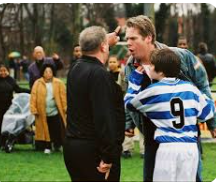People often say that parenting is the hardest job in the world. It is interesting in that regard because, unlike every other job for which we might apply or be engaged in, to become a parent there is no application process, no interview (“So, tell us, why do you want to be a parent?”), no qualification required (except a limited knowledge of practical Biology), no appraisal, no training – and, for that matter, no pay (indeed, we pay to do the job, constantly, unendingly)! Yet, there perhaps is another job that is even harder, even with screening, training, appraising, one that has been more in the spotlight in recent weeks. That job is refereeing. Why is that so?
Refereeing is incredibly hard, especially at the higher levels, as there are thousands (even millions, if we include television figures) of people watching and indeed commenting on the performance of the referee from the comfort of their seats (and seeing things from a different angle). Imagine if we had thousands of people watching our performance as parents! But then, that is not all; we have players judging referees after the match, not to mention the coaches/managers, plus of course, the pundits (who probably have never refereed a match) and the commentators who have far more information available to them. Few of them will have had the courage to put themselves forward as a referee; is there not a saying that we should not judge someone until we have walked a mile in their shoes? Referees have been receiving death threats for them and their families; will we receive death threats for our performance as parents? Shall we assemble pundits to commentate publicly on our performance as parents?
However, that is not the only reason why refereeing is so hard. All these other self-proclaimed experts are watching the game from a different angle and for different reasons to the referee. Referees are seeking to be aware of potential errors in many different areas, not just the one the critics want to focus on especially. Then, they are being pressurised by players and coaches surrounding them in numbers, forcibly trying to persuade the referee to change decisions. We have players appealing for every decision to go their own way. We have players acting to try to con the referee. Wait! That does sound like what happens to parents too! So we do know what it is like!
And then, of course we expect a referee never to make a mistake, even though we make hundreds (though often we will not admit to them). But, here is the thing that we have missed. Referees are human; they make mistakes. Those mistakes or decisions are not deliberate; they are not biased or cheating. Furthermore, sometimes a referee’s decision will go against us but at other times, which we tend to forget or ignore, they go in our favour. Do we get it right every time as parents? Maybe we should have referees monitoring our performance. Would technology assist us?
But, wait a minute, we do! In soccer we have VAR; in rugby we have the TMO; in cricket we have DRS. Technology can come to our rescue! At least, that is what we think should happen but in reality it does not. In recent weeks, with the cricket and rugby World Cups, not to mention the ongoing English Premier League, there have been furious debates on how even technology is getting decisions wrong. So now we do not just complain about the referee but also about the technology – or rather, the human’s interpretation of the technological evidence. Endless footage, with people trawling through replays of matches for days afterwards, in slow motion, from numerous different angles, looking for mistakes, to prove that that person’s team was treated unfairly, has now become the norm. What if we had slow motion, all-angle replays of all our parenting with pundits analysing?
We think we will eliminate mistakes with the increasing advance of Artificial Intelligence. So, perhaps the answer is to have robots refereeing matches? But then, if that is the solution, then it should be robots playing the match, and then robots should be the ones watching the game, and robots should be doing the match analysis. And then robots should take over as parents as they will do the job better; but then there would be no children, only robots… Is that where we are heading?
We would not want people to apply the same approach to us as parents as referees have. We may not want Artificial Intelligence to intrude on our sport but neither do we want Superficial Ignorance.




